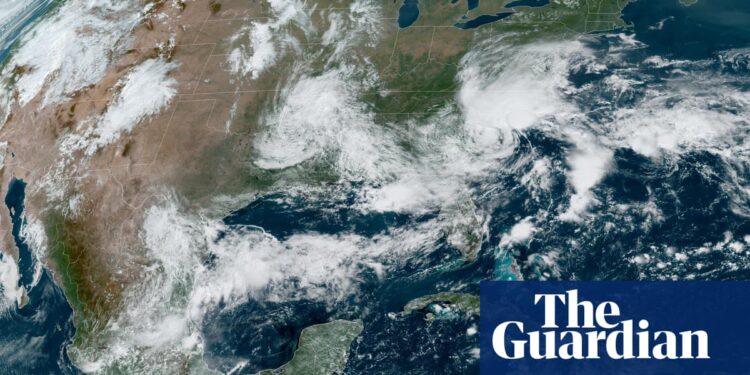Tropical storm conditions were expected along a stretch of the US south-east seacoast as a low-pressure system bringing gusty winds, heavy rain and potential flooding has strengthened, forecasters said on Monday.
The system was expected to reach the South Carolina coast on Monday afternoon and then move inland across the Carolinas from Monday night through Wednesday, the US National Hurricane Center (NHC) said. Strong winds were approaching the coast on Monday morning and were expected to spread onshore.
A tropical storm warning was in effect from Edisto Beach, South Carolina, northward to Ocracoke Inlet, near the southernmost extreme of North Carolina’s Outer Banks.
The system was centered on Monday morning about 100 miles (160km) east of Charleston, South Carolina, and about 85 miles south of Cape Fear, North Carolina. It had maximum sustained winds of 50mph (85km/h) and was moving to the north-west at 3mph, forecasters said.
The system still had a chance of becoming a tropical or subtropical storm – but forecasters have said those chances may have started to decrease since it seemed to have become less organized.
In an updated hurricane outlook in August, the National Oceanic and Atmospheric Administration (Noaa) was still predicting a highly active Atlantic hurricane season thanks to near-record sea surface temperatures and the possibility of La Niña. Emergency management officials have urged people to stay prepared.
Maximum winds were expected to decrease as the low approached the coast. But tropical-storm-force winds were still expected to occur within the warning areas. It would probably dissipate over the Carolinas by late Wednesday, forecasters said.
The storm was expected to dump 4-8in (10-20cm) of rain in north-east South Carolina into south-east North Carolina and up to 10 inches in isolated spots, with smaller amounts expected across the remainder of North Carolina through Tuesday, according to forecasters.
Over much of Virginia, 1-3in of rainfall, with locally higher amounts, were expected from Monday night through Wednesday. The NHC predicted the rainfall could lead to isolated and scattered flash and urban flooding, as well as minor river flooding.
The US south-east coast also could expect rough surf over the next few days, forecasters said.
Elsewhere in the Atlantic, Tropical Storm Gordon weakened to a depression as it swirls through open ocean waters. Gordon could either dissolve in upcoming days or strengthen back into a tropical storm, forecasters said.
US forecasters continued tracking Gordon after Hurricane Francine made landfall in south-east Louisiana on Wednesday, causing flooding and widespread power outages.
Guardian staff contributed reporting





